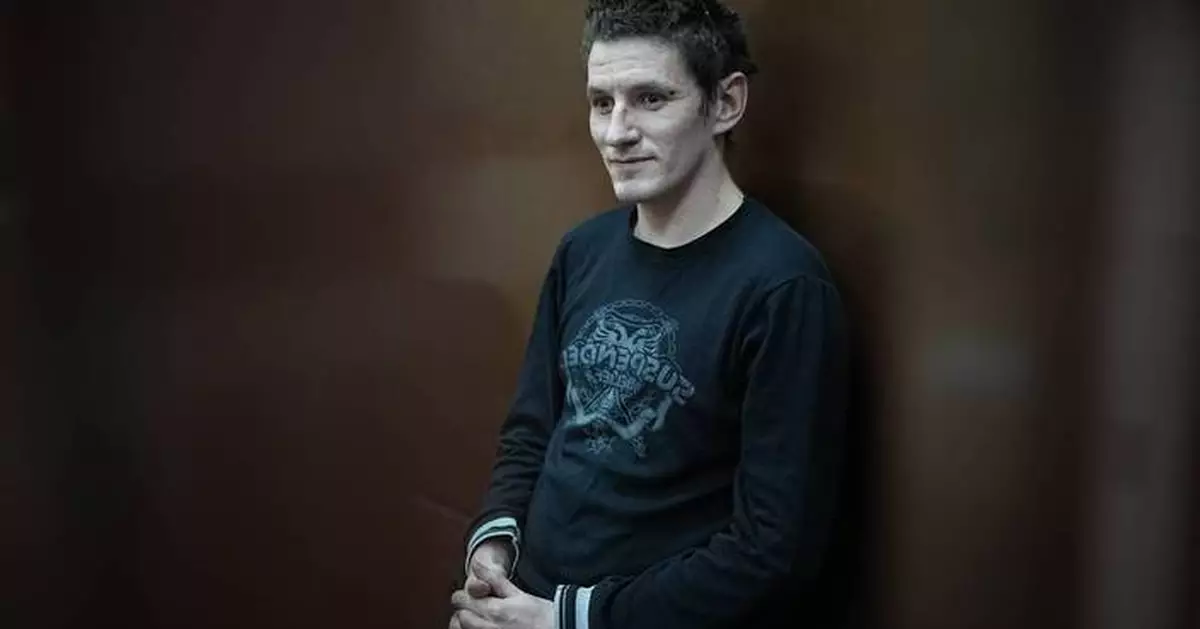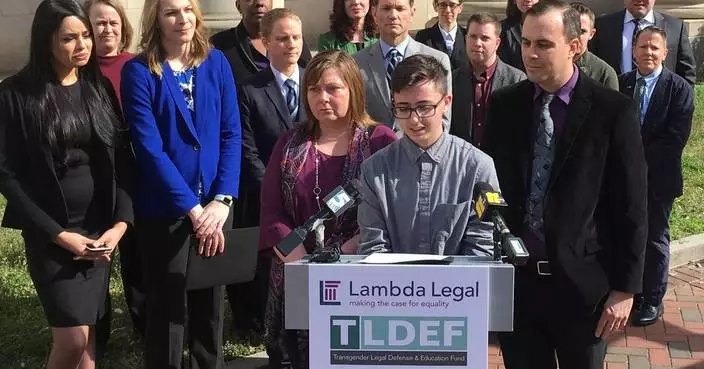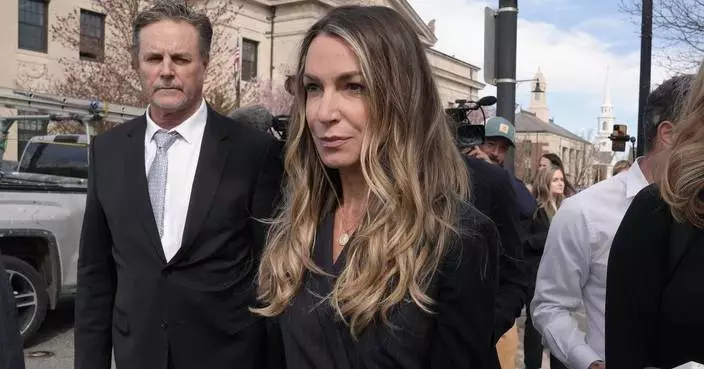MOSCOW (AP) — A U.S. citizen arrested on drug charges in Moscow amid soaring Russia-U.S. tensions over Ukraine appeared in court on Monday.
Robert Woodland Romanov is facing charges of trafficking large amounts of illegal drugs as part of an organized group — a criminal offense punishable by up to 20 years in prison. He was remanded into custody in January, and the trial began in the Ostankino District Court in late March. A new court hearing is scheduled for next week.
In January, the U.S. State Department said it was aware of reports of the recent detention of a U.S. citizen and noted that it “has no greater priority than the safety and security of U.S. citizens overseas,” but refrained from further comment, citing privacy considerations. The U.S. Embassy in Moscow issued a similar statement at the time.
Russian media noted that the name of the accused matches that of a U.S. citizen interviewed by the popular daily Komsomolskaya Pravda in 2020.
In the interview, the man said that he was born in the Perm region in the Ural Mountains in 1991 and was adopted by an American couple when he was 2. He said that he traveled to Russia to find his Russian mother and eventually met her on a TV show in Moscow.
The man told Komsomolskaya Pravda that he liked living in Russia and decided to move there. The newspaper reported that he settled in the town of Dolgoprudny just outside Moscow and was working as an English teacher at a local school.
Arrests of Americans in Russia have become increasingly common as relations between Moscow and Washington sink to Cold War lows. Washington accuses Moscow of targeting its citizens and using them as political bargaining chips, but Russian officials insist they all broke the law.
Some have been exchanged for Russians held in the U.S., while for others, the prospects of being released in a swap are less clear.

U.S. citizen Robert Woodland Romanov sitss in a cage prior to a court session on drug-related charges in Moscow, Russia, Monday, April 15, 2024. Romanov is facing charges of trafficking large amounts of illegal drugs as part of an organized group — a criminal offense punishable by up to 20 years in prison. (AP Photo/Alexander Zemlianichenko)

U.S. citizen Robert Woodland Romanov sits in a cage prior to a court session on drug-related charges in Moscow, Russia, Monday, April 15, 2024. Romanov is facing charges of trafficking large amounts of illegal drugs as part of an organized group — a criminal offense punishable by up to 20 years in prison. (AP Photo/Alexander Zemlianichenko)
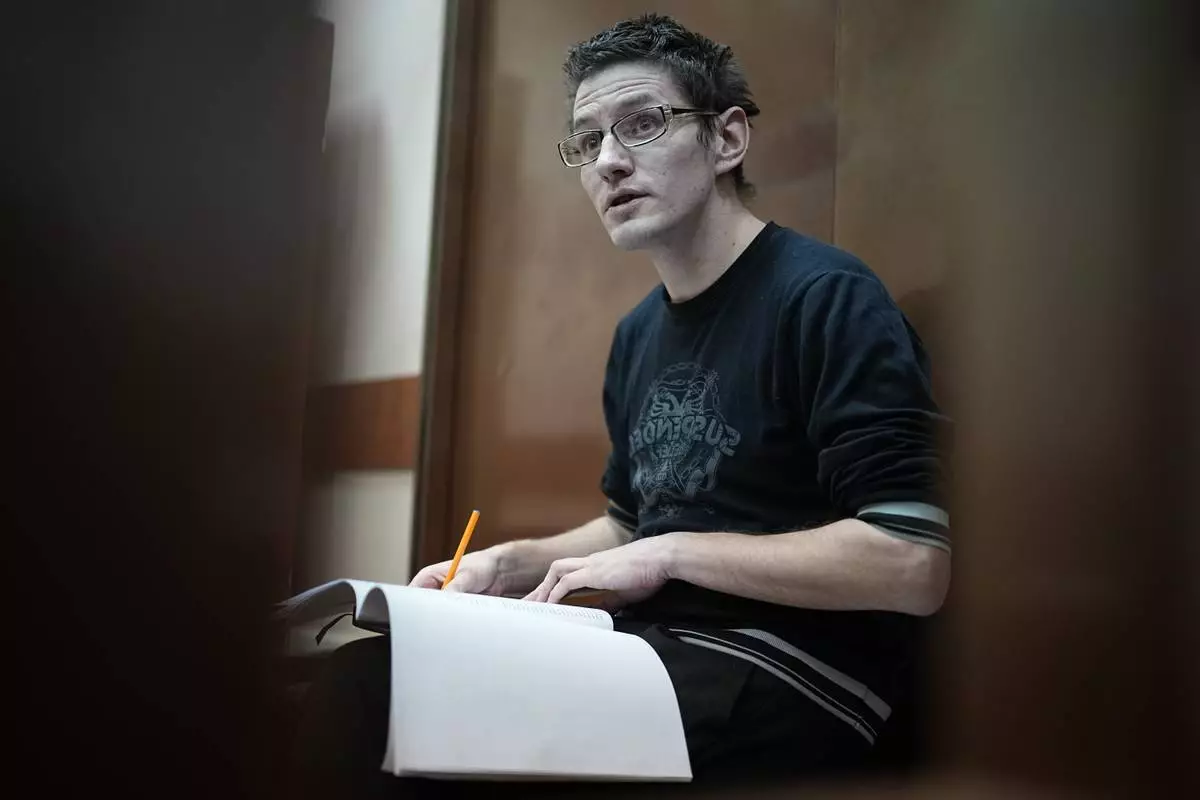
U.S. citizen Robert Woodland Romanov sits in a cage prior to a court session on drug-related charges in Moscow, Russia, Monday, April 15, 2024. A U.S. citizen arrested on drug charges in Moscow amid soaring Russia-U.S. tensions has appeared in court. Robert Woodland Romanov is facing charges of trafficking large amounts of illegal drugs as part of an organized group — a criminal offense punishable by up to 20 years in prison. (AP Photo/Alexander Zemlianichenko)

U.S. citizen Robert Woodland Romanov sits in a cage prior to a court session on drug-related charges in Moscow, Russia, Monday, April 15, 2024. A U.S. citizen arrested on drug charges in Moscow amid soaring Russia-U.S. tensions has appeared in court. Robert Woodland Romanov is facing charges of trafficking large amounts of illegal drugs as part of an organized group — a criminal offense punishable by up to 20 years in prison. (AP Photo/Alexander Zemlianichenko)
TOPEKA, Kan. (AP) — Republican legislators moved Monday to enact a ban in Kansas on gender-affirming care for minors and bar state employees from advocating social transitioning for transgender youth, brushing aside criticism that they were hurting the state's image.
The GOP-supermajority Kansas House expected to vote on overriding Democratic Gov. Laura Kelly's veto only hours after the Senate did on a 27-13 vote, exactly the required two-thirds margin. The vote in the House was expected to be close after LGBTQ+ rights advocates raised questions about whether the provision against promoting social transitioning is written broadly enough to apply to public school teachers who show empathy for transgender students.
Under the bill, social transitioning includes “the changing of an individual’s preferred pronouns or manner of dress,” and the rule would apply to state workers who care for children. The measure doesn’t spell out what constitutes promoting it.
The bill is part of a broader push to roll back transgender rights from Republican lawmakers in statehouses across the U.S. Kansas would be the 25th state to restrict or ban such care for minors, and this week the South Carolina Senate expected to debate a similar measure that already has passed the state House.
“Unfortunately, in today’s society, the predator in particular is a woke health care system,” said Republican state Sen. Mark Steffen, a central Kansas anesthesiologist and pain management specialist.
Like other Republicans across the U.S., Steffen and other GOP lawmakers in Kansas argued that they're protecting children struggling with their gender identities from being pushed into health care that the lawmakers see as experimental and potentially harmful. But that puts them at odds with the American Medical Association, the American Academy of Pediatrics and other major U.S. medical groups.
LGBTQ+ rights groups such as Lambda Legal, the American Civil Liberties Union and Equality Kansas have stopped short of saying they would challenge the new law in court, but they've said they believe the provisions preventing state employees from advocating social transitioning violates their free speech rights. They've said that provision makes the Kansas law more sweeping than laws in other states.
Other critics argued that enacting such a ban sends a message that transgender residents aren't welcome. When Kelly vetoed a similar ban last year, she suggested that it would hurt the state's business climate.
“This is not the message we want to send to Americans about the welcoming opportunities that Kansas has,” said state Sen. Tom Holland, a northeastern Kansas Democrat.
About 300,000 youths ages 13 to 17 identify as transgender in the U.S., according to estimates by the Williams Institute, an LGBTQ+ research center at UCLA Law. It estimates that in Kansas, about 2,100 youths in that age group identify as transgender.
Republican lawmakers last year enacted laws barring transgender girls and women from female college and K-12 sports teams and ending legal recognition of transgender residents' gender identities. Transgender residents no longer can change the listing for “sex” on their driver's licenses or birth certificates to match their gender identities, something Kelly's administration had allowed.
“I do feel like there’s a genuine fear about me and what my body means, when I’m very happy,” Issac Johnson, who is transgender and just finished a social work internship in Topeka’s public schools, said during a recent Statehouse news conference.
Transgender youth, parents of transgender children and dozens of medical and mental health providers all described gender-affirming care as life-saving and argued that it lessens severe depression and suicidal tendencies among transgender youth. At least 200 health care providers signed a letter to lawmakers opposing a veto override.
During the Senate's debate Monday, Democratic Minority Leader Dinah Sykes' voice wavered as she spoke against the bill and told transgender residents, “We accept you and we cherish you.”
“I urge my colleagues to show grace and kindness,” she said.
But supporters of the bill repeatedly cited the recent decision of the National Health Service of England to stop covering puberty blockers as a routine treatment for gender dysphoria in minors.
NHS England issued a nearly 400-page report from its review, concluding that there is not enough evidence about the long-term effects of gender-affirming care or how well it works. In a foreword, the review’s leader added, “This is an area of remarkably weak evidence.”
Kansas Senate Health Committee Chair Beverly Gossage, a Kansas City-area Republican, told her colleagues: “We’re on the right side of history on this.”
Supporters of the bill also said many of their constituents simply have strong misgivings about medical treatments for children struggling with their gender identities.
The proposed ban would require Kansas to revoke the medical license of any doctor who violates it. It would bar gender-affirming care from being provided on state property or by recipients of state tax dollars.
Kansas' Medicaid program, providing health coverage for poor and disabled residents, also couldn't cover gender-affirming care. On Monday, in a case likely headed to the U.S. Supreme Court, a federal appeals court ruled that West Virginia and North Carolina’s refusal to cover certain health care for transgender people with government-sponsored insurance is discriminatory.
“The language put in the bill is, in my opinion, is to try to prevent state entities, state employees, from promoting the use of different pronouns and, if you will, the search for gender change,” Republican state Rep. John Eplee, a northeastern Kansas family physician.
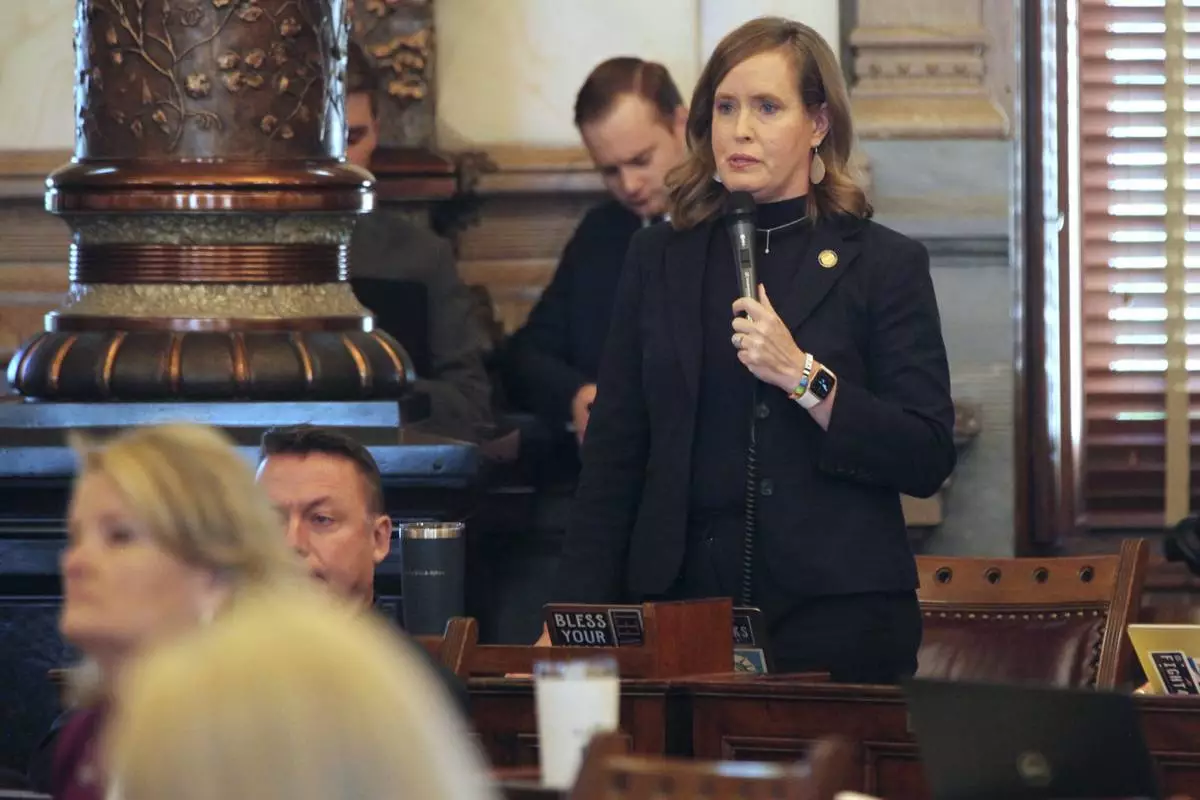
Kansas Senate Minority Leader Dinah Sykes, D-Lenexa, speaks against overriding Democratic Gov. Laura Kelly's veto of a proposed ban on gender-affirming care for minors. Sykes argues that the ban would deny transgender children crucial care that helps lessen severe depression and suicidal tendencies. (AP Photo/John Hanna)
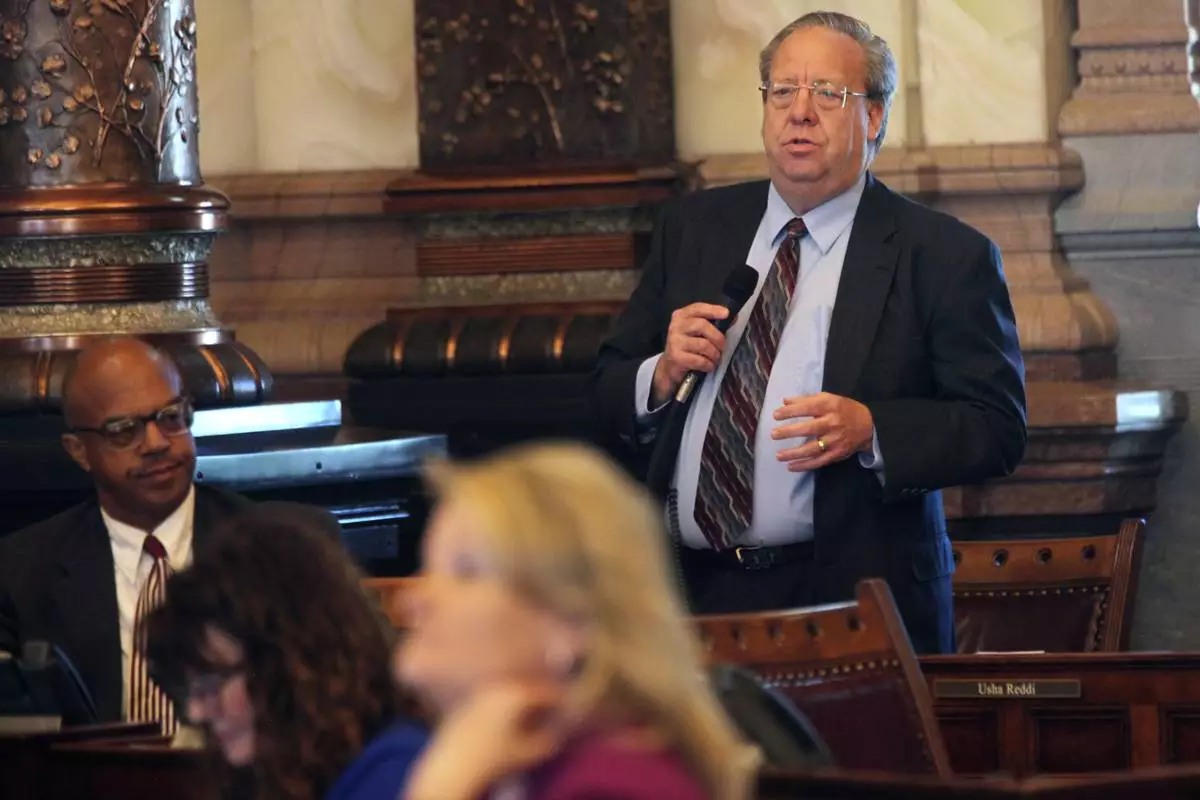
Kansas state Sen. Tom Holland, D-Baldwin City, speaks against overriding Democratic Gov. Laura Kelly's veto of a proposed ban on gender-affirming care for minors, Monday, April 29, 2024, at the Statehouse in Topeka, Kan. Holland suggested that the ban would send a message that Kansas is not welcoming. (AP Photo/John Hanna)
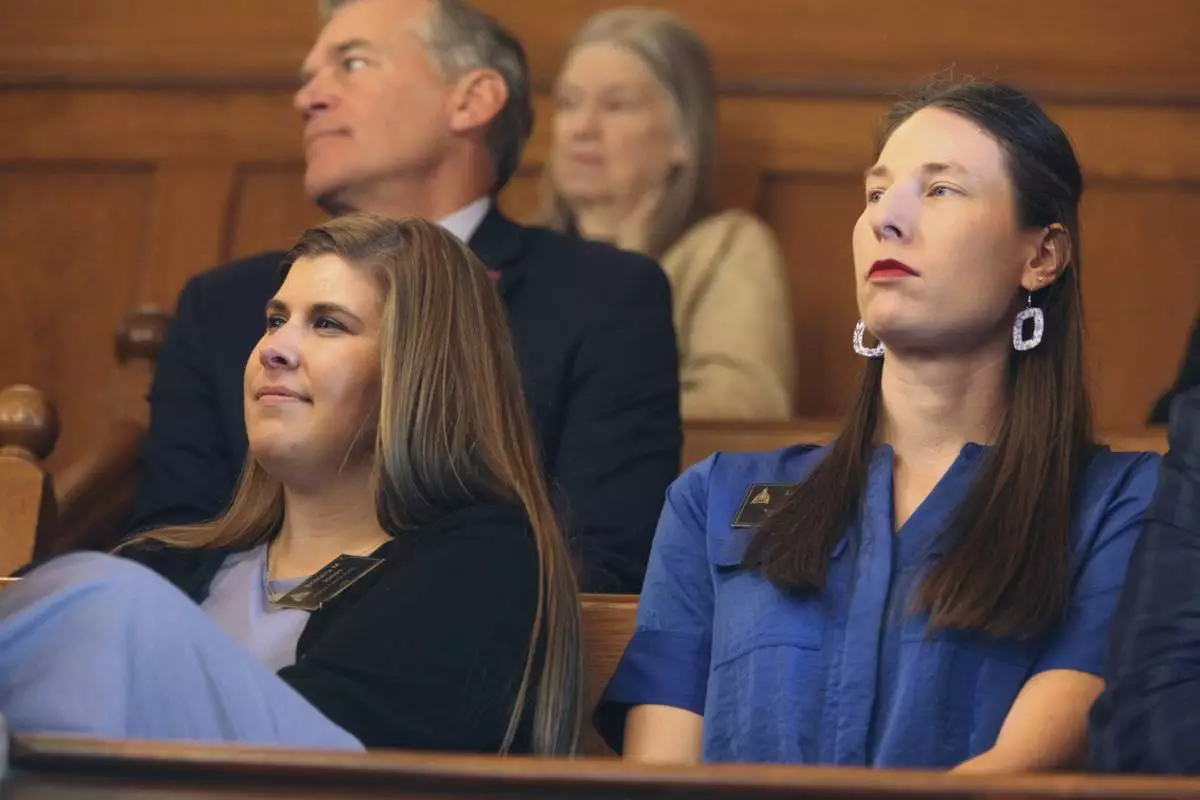
Lobbyists Brittany Jones, left, of the conservative group Kansas Family Voice, and Lucrecia Nold, right, of the Kansas Catholic Conference, watch from the Senate's west gallery as members debate overriding a proposed ban on gender-affirming care for minors, Monday, April 29, 2024, at the Statehouse in Topeka, Kan. Both of their organizations support a ban. (AP Photo/John Hanna)

Isaac Johnson, who just completed an internship with Topeka's public schools and is finishing work on a social work degree, talks to reporters during a news conference, Thursday, April 26, 2024, in front of a mural at the Statehouse in Topeka, Kan. Johnson, who is transgender, worries about the effects of a proposed ban on gender-affirming care for minors, which also would bar state employees from promoting social transitioning for youth. (AP Photo/John Hanna)
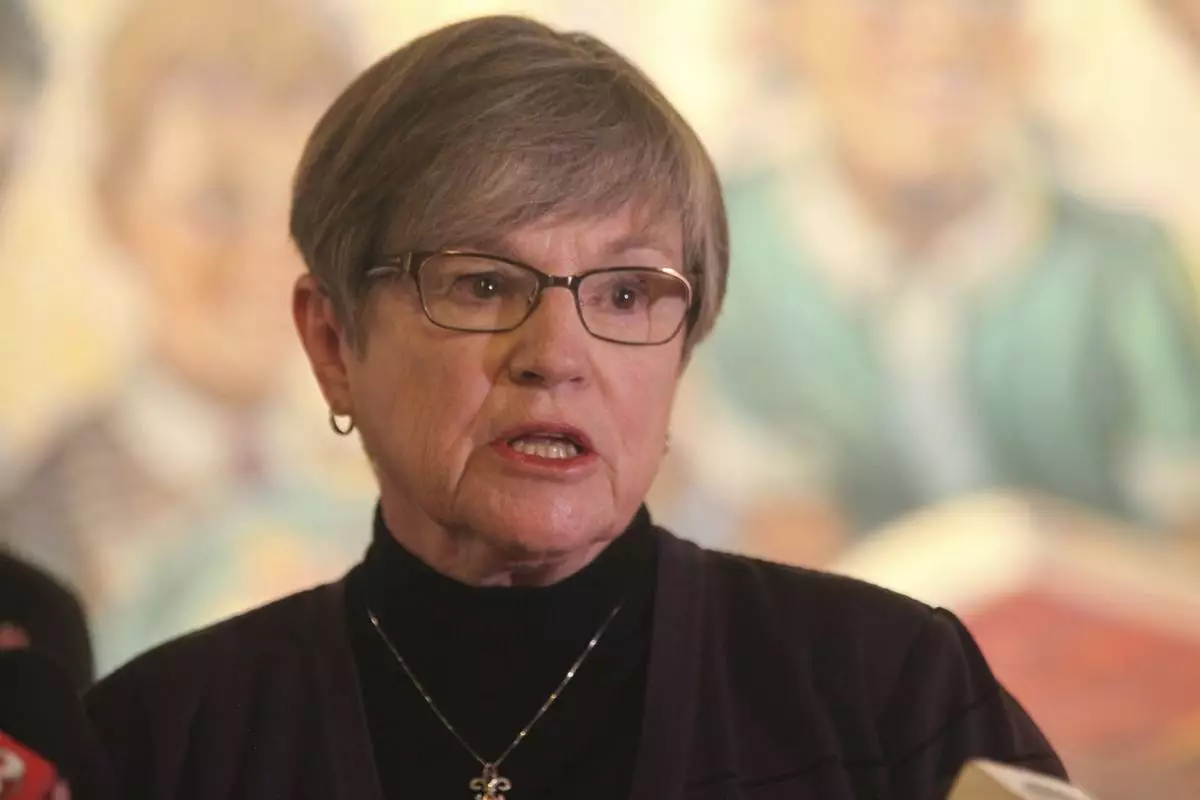
Kansas Gov. Laura Kelly speaks at a public event, Monday, April 29, 2024, at the Statehouse in Topeka, Kan. Kelly has vetoed a proposed ban on gender-affirming care for minors that also would bar state employees from advocating social transitioning for transgender children. (AP Photo/John Hanna)

Kansas state Sen. Mark Steffen, R-Hutchison, speaks in favor of overriding Democratic Gov. Laura Kelly's veto of a bill banning gender-affirming care for minors, Monday, April 29, 2024, at the Statehouse in Topeka, Kan. Steffen says the state must protect "confused" children from a "confused health care system and confused parents." (AP Photo/John Hanna)






